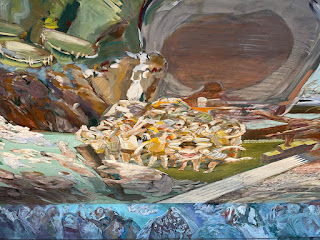Gewandhaus, Great Hall, Leipzig, Germany. Parkette Mitte (Seat 14-1, 17 euros).
All the artists came out at the conclusion of the concert.
Program
"O I wretched man, who will redeem me" by Georg Friedrich Kauffmann (1679-1714).
"Arm yourselves, ye heavenly choirs" by Kauffmann.
"The love of God is poured out" by Kauffmann.
"Come, Holy Spirit, Lord God" BWV 652 by J. S. Bach (1685-1750).
Cantata "Erschallet, ihr Lieder" BWV 172.3 by Bach.
Bach Fest has a English version of the website, from which I type the titles in the "Program" section. No idea why the last piece is not translatable by Google Translate. Microsoft translates it as "Do you sing songs?" More along the lines of "Resounding songs."
Artists
Collegium Vocale Leipzig
Merseburger Hofmusik
Isabel Schicketanz - soprano; Britta Schwarz - alto; Tobias Hunger - Tenor I; Christoph Pfaller Tenor II; Tobias Berndt - Bass.
Well, it turns out the first ever Leipzig Bach Fest event we attended was not even "Mostly Bach." The whole concert lasted 2 1/2 hours, with a 30-minute intermission. Of the two hours of music, perhaps 1:20 hours was for works by Kauffmann.
Who is Kauffmann, you ask? From our friend David, I learned that Bach wasn't actually the first choice for the Thomas Church "cantorship." It was first offered to Telemann, who used the offer to leverage a higher pay from his then current sponsor. Then it was offered to another person (I am sure his name is well-known to Bach historians, I simply forget), but his then sponsor wouldn't let him leave. Bach was actually the third choice ... and the rest - as they say - is history. There were many other contenders for the job, and Kauffmann was one of them.
There is some organization to today's program that is not obvious from the titles of the pieces performed. The first piece is about man's sinful condition, the second piece about Jesus's ascension to heaven, the third about the holy spirit of the Pentecost. After an organ interlude (performed by the conductor Schonheit), we heard Bach's cantata on rejoicing before and adoration of the Trinity.
The musicians after performing the second Kauffmann piece, just before the intermission.
The event is title "Organ Concert." Schonheit played one rather short piece of organ music on the auditorium's main organ. There was an organ continuo for the other pieces.
The concert is titled "Organ Concert" on line.
I am not a fan of baroque music, and tonight's concert did nothing to convince me otherwise. The extra 45 minutes of music didn't help. Although Anne pointed out Bach was more enjoyable than Kauffmann, and I agree. The organ piece sounded "simple" enough, and I tried my best to follow the lines, understand the structure, and map out the harmony as the playing progressed. Didn't get much of that.
The ensemble used period instruments, and spent a lot of time tuning before each piece. It started with the lead violin getting an a from the organ, then bring that to the string section, and all the players then went through all the strings. That's followed by the "continuo organ" playing chords to make sure. I didn't see the cello and bass working so diligently at it, though. A bit much for me, even knowing the strings they use tend to relax more than modern strings.
Period instruments study is a huge subject. I am fine with historical authenticity. I do wonder, however, if singers techniques have changed over the centuries. Do people try to research what they were, and try to replicate them? I was under the impression most high voices were sung by countertenors and castratos, but those parts are now routinely sung by women. So changes are accepted, after all.
This was my first visit to the legendary Gewandhaus, at least in terms of its succession of distinguished conductors. Mendelssohn about 200 years ago, and Masur more recently. (Right now it is Andris Nelsons, who also leads the Boston Symphony.) And reality didn't meet expectations, at all.
View from Gewandhaus. The building across Augustusplatz is Leipzig Opera.
One can see these huge wall paintings inside the concert hall. The Gewandhaus website has a section dedicated to the story behind the building of the hall, and describes this as "a striking mural encompassing a vast area of the main foyer's sloping ceiling and the largest contemporary painting of its kind in Europe," called Song of Life, by Sighard Gille.
On closer examination they seem crudely done.
The organ has some pipes pointing outward, instead of all upward.
The hall is functional, quite austere, and feels even more "eastern European" than Kulturpalast. It's seating capacity is 1900, today there were may be 500 people.
It was about 10:30 pm that we left the auditorium. It was a short walk back to the hotel.













No comments:
Post a Comment